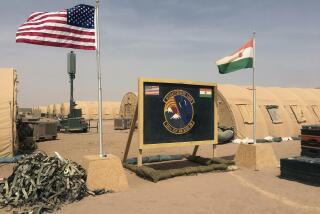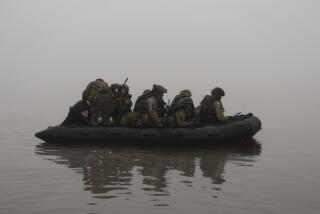U.S. Troops Quietly Cede Key Bridge to Bosnia Serbs
- Share via
BRCKO, Bosnia-Herzegovina — Six days after U.S. troops came under attack at a strategic bridge here, the American forces quietly withdrew from the site and handed it over to Bosnian Serb police.
On Thursday, a large Bosnian Serb flag hung at one end of the bridge in place of an American one, following the overnight withdrawal of a U.S. Army task force and the dismantling of a checkpoint that had controlled the bridge since NATO peacekeepers first deployed here 21 months ago.
The bridge spans the Sava River between Brcko in the Bosnian Serb half of Bosnia-Herzegovina and, at the other end, Croatia.
It was the second time in two days that U.S. NATO forces relinquished control of a strategic installation to Bosnian Serbs whose leaders have been blocking elements of the U.S.-brokered peace accords that ended the war in Bosnia.
On Tuesday, U.S. troops handed a key television transmitter back to Bosnian Serb forces who, like the police in Brcko, are loyal to indicted war crimes suspect Radovan Karadzic. The transmitter had been used to broadcast virulently anti-West rhetoric, comparing NATO troops to Nazi occupiers, but the Serbs regained it when they promised to clean up their language.
International officials said surrendering the bridge was not a concession to the Serbs but was necessary to better protect American troops who are stationed in and around Brcko.
Tensions have been high since Aug. 28, when angry Bosnian Serb mobs attacked U.S. soldiers in a day of rioting that left two Americans and several Serbian civilians wounded. Faced with a new, unspecified threat, military planners decided to reduce the exposure of the American patrols that manned the bridge and abandon the site, officials said.
The withdrawal, announced only after it was complete, was “part of a continuous effort to enhance security throughout the area,” the American military sector of the NATO-led mission said in a statement released Thursday.
Many in the large corps of international aid and diplomatic workers, as well as many Bosnian Serb residents, were stunned to wake up Thursday morning and find the U.S. troops had left. Some of the Serbs immediately began to worry about a possible invasion by their enemies across the river, the Croats.
Roving patrols will be used instead of the bridge checkpoint for “greater presence and flexibility,” the U.S. military said. On Thursday afternoon, several Humvees with manned gunners were seen patrolling the city.
Last week’s violence came after U.S. troops attempted to help Bosnian Serb President Biljana Plavsic install her own police in five towns and cities, but the operation went awry, failed and exploded. Plavsic is vying with Karadzic, her predecessor, for control over Republika Srpska, the Bosnian Serb republic--a struggle that has divided this already fragmented country even further.
Robert W. Farrand, the American diplomat in charge of administering Brcko under an internationally supervised arbitration agreement, said he had ordered the Bosnian Serb police, now controlling the bridge, not to charge the exorbitant and illegal visa and road-usage fees they normally do. He denied a deal had been struck that gave the Serbs the bridge in exchange for cooperation or other agreements.
“There was no quid pro quo,” he said in an interview.
More to Read
Sign up for Essential California
The most important California stories and recommendations in your inbox every morning.
You may occasionally receive promotional content from the Los Angeles Times.













